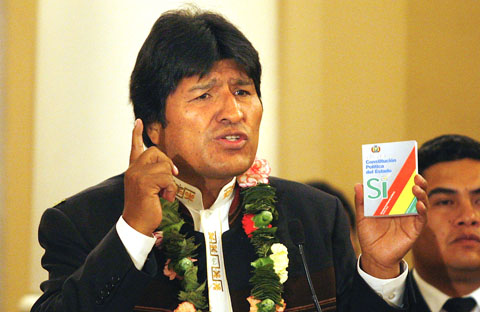Bolivian President Evo Morales on Thursday called a referendum for Dec. 7 to rewrite his country’s Constitution, sharpening a political struggle with rebel governors opposed to his sweeping socialist reforms.
“This is to deepen democracy,” he said, announcing from his presidential palace in La Paz a decree setting up the plebiscite.
The new referendum — which had been widely expected since Morales won two-thirds support in an Aug. 10 recall referendum confirming his mandate — is “to consolidate the process of change,” he said.

PHOTO: AP
Regional authorities in the eastern state of Santa Cruz, an opposition bastion, immediately challenged the legality of the decree.
“We reject the policies that the government wants to impose through a decree,” they said in a statement.
They stressed that the Aug. 10 recall referendum had also solidly confirmed the mandates of several of the opposition governors ranged against Morales.
The rebel governors have already said they will not permit any such referendum to be held in their states.
The president, who became the first indigenous leader of Bolivia in 2006, is locked in a worsening power struggle with the governors of five of the country’s nine states who are blocking his attempts to redistribute more land and national wealth to the indigenous majority.
The governors of the states of Santa Cruz, Beni, Tarija and Chuquisaca — all with populations of mostly European descent and with indigenous minorities — are demanding more control over revenues from gas fields in their territories that are vital to the economy of Bolivia, South America’s poorest nation.
Morales has been prevented in recent weeks by protesters in those states from landing his aircraft. On Wednesday, he was forced to touch down over the border in Brazil after his helicopter ran low on fuel over opposition territory.
The long crisis had stymied Morales’ forceful efforts to redraft the Constitution to enshrine his reforms, and he had hoped the Aug. 10 referendum would give him the upper hand.
Instead, the results secured his mandate and those of his chief foes. That briefly pushed them together for an attempt at dialogue to find a solution, but the talks failed.
The opposition governors quickly ratcheted up anti-Morales demonstrations, prompting the president last weekend to order troops to guard gas and oil installations in the east.
The threat of the confrontation turning into widespread unrest is real.
A few violent incidents have already erupted over the past 18 months between pro- and anti-government protesters, resulting in half a dozen deaths.
Roads in some parts of eastern Bolivia are being blocked by anti-Morales protesters, and local authorities in those areas say they are “on a war-footing.”

Eleven people, including a former minister, were arrested in Serbia on Friday over a train station disaster in which 16 people died. The concrete canopy of the newly renovated station in the northern city of Novi Sad collapsed on Nov. 1, 2024 in a disaster widely blamed on corruption and poor oversight. It sparked a wave of student-led protests and led to the resignation of then-Serbian prime minister Milos Vucevic and the fall of his government. The public prosecutor’s office in Novi Sad opened an investigation into the accident and deaths. In February, the public prosecutor’s office for organized crime opened another probe into

RISING RACISM: A Japanese group called on China to assure safety in the country, while the Chinese embassy in Tokyo urged action against a ‘surge in xenophobia’ A Japanese woman living in China was attacked and injured by a man in a subway station in Suzhou, China, Japanese media said, hours after two Chinese men were seriously injured in violence in Tokyo. The attacks on Thursday raised concern about xenophobic sentiment in China and Japan that have been blamed for assaults in both countries. It was the third attack involving Japanese living in China since last year. In the two previous cases in China, Chinese authorities have insisted they were isolated incidents. Japanese broadcaster NHK did not identify the woman injured in Suzhou by name, but, citing the Japanese

RESTRUCTURE: Myanmar’s military has ended emergency rule and announced plans for elections in December, but critics said the move aims to entrench junta control Myanmar’s military government announced on Thursday that it was ending the state of emergency declared after it seized power in 2021 and would restructure administrative bodies to prepare for the new election at the end of the year. However, the polls planned for an unspecified date in December face serious obstacles, including a civil war raging over most of the country and pledges by opponents of the military rule to derail the election because they believe it can be neither free nor fair. Under the restructuring, Myanmar’s junta chief Min Aung Hlaing is giving up two posts, but would stay at the

YELLOW SHIRTS: Many protesters were associated with pro-royalist groups that had previously supported the ouster of Paetongtarn’s father, Thaksin, in 2006 Protesters rallied on Saturday in the Thai capital to demand the resignation of court-suspended Thai Prime Minister Paetongtarn Shinawatra and in support of the armed forces following a violent border dispute with Cambodia that killed more than three dozen people and displaced more than 260,000. Gathered at Bangkok’s Victory Monument despite soaring temperatures, many sang patriotic songs and listened to speeches denouncing Paetongtarn and her father, former Thai prime minister Thaksin Shinawatra, and voiced their backing of the country’s army, which has always retained substantial power in the Southeast Asian country. Police said there were about 2,000 protesters by mid-afternoon, although